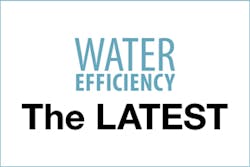SB 606 sets the standards and process to make water efficiency a way of life
as California braces for climate change, strained water supplies
Sens. Bob Hertzberg, D-Van Nuys, and Nancy Skinner, D-Berkeley, unveiled legislation today that establishes permanent water efficiency standards and puts California on the path to maximizing its water supplies and minimizing waste in the same way it has for decades with gas and electricity.
SB 606 sets water conservation goals for cities to meet by 2026 and spells out the process for the State Water Resources Control Board and the Department of Water Resources to develop uniform indoor and outdoor water efficiency standards, based on local climate zones and regional precipitation.
“We know water supplies will be severely strained in California in the 21st century, as climate change reduces snowpack and creates chronic cycles of drought,” Hertzberg said. “The first step in managing a precious resource is to make the most of it, and that’s what we’re doing by aggressively pursuing efficiency standards.”
The Metropolitan Water Reclamation District of Greater Chicago is seeking a visionary Executive Director. The District is an award-winning wastewater agency which has been a leader in protecting the Chicago area water environment for over a 120 years. For information and to apply, click here or contact [email protected].
The District is an Equal Opportunity Employer.
“Energy efficiency is hardwired into our daily lives,” Skinner said. “It’s time for California to make water efficiency as easy and effortless as we have made energy efficiency.”
California’s energy efficiency movement began following the oil and energy crisis of the 1970s, and those policies continue to save ratepayers money every day, reducing each and every Californian’s per capita energy use.
With water, however, California has no dedicated plan or long-term goal for efficiency. California has historically treated water as an endless resource for homes, farms, industry and wildlife, but the state’s growing population and changing climate are expected to strain California’s water supply.
According to the New York Times, the quadrennial National Climate Assessment, which is being finalized this year, says climate change will probably reduce California’s snowpack and produce chronic, long-lasting droughts in the state by the end of the century.
In 2009, the Legislature established a goal of reducing urban water use by 20 percent by 2020. Shortly thereafter, California began suffering through the worst drought in its statehood. In 2015 alone, the drought cost the state more than $2.7 billion in economic activity.
The governor ordered emergency measures beyond the 2020 goal, mandating an immediate 25 percent statewide reduction in water use. In response, the State Water Resources Control Board and the Department of Water Resources developed rules, targets and enforcement mechanisms to achieve those cuts evenly across the state.
The rules, though, frustrated local governments and water agencies, which criticized the lack of flexibility on how cuts were achieved and the lack of credit given to those agencies that had already made efficiency a priority.
Even as the drought ends this year, many questions remain about how the state and local agencies will respond to the next water shortage. Currently, there is no consistent urban water efficiency standard, and the state lacks key data on agricultural water uses as well as short- and long-term water contingency planning tools.
SB 606 brings all the legislative, administrative and local work on water conservation planning together and charts the course for dramatically improving water efficiency in the 21st century.
Senator Nancy Skinner (@NancySkinnerCA) represents the 9th Senate District which includes the cities of Oakland, Richmond, Berkeley, Albany, Alameda, San Leandro, El Cerrito, El Sobrante, Emeryville, Hercules, Kensington, Pinole, Piedmont, San Pablo, and Rodeo. She serves as Chair of the Senate Public Safety Committee and the Senate Budget Subcommittee No. 5 on Corrections, Public Safety and the Judiciary.




